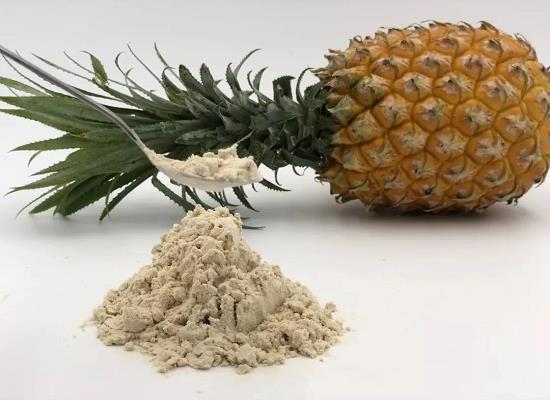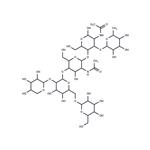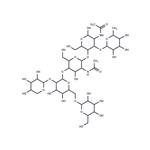Bromelain: Source, Antimicrobial Efficacy and Therapeutic Applications
Jan 22,2024
General Description
Bromelain is a protein found in pineapple trees, particularly in the stem. It has various applications in medicine, dietary supplements, and cosmetics due to its anti-inflammatory properties. It has been shown to have antimicrobial properties, effectively fighting against infections caused by different bacteria. Bromelain also has therapeutic applications in the treatment of burns, allergies, blood clotting disorders, inflammation, and even cancer. It prevents platelet aggregation and promotes fibrinolysis, making it useful in conditions involving blood clotting. Additionally, bromelain enhances antibiotic absorption and has anti-edematous and antioxidant properties. It has shown promise in cardiovascular disorders, musculoskeletal conditions, and cancer treatment. Overall, bromelain's diverse and promising therapeutic applications make it a valuable protein.

Figure 1. Bromelain
Source
Bromelain is a protein that was first discovered by Venezuelan scientist Vicente Marcano in 1891 and its extraction and investigation began three years later in 1894. This protein is abundant in both the fruit and stem of pineapple trees, with the stem containing significantly more bromelain than the fruit. This discovery led to the monetization of a waste by-product, stem bromelain. The defensive protein bromelain is found in the pineapple plant to shield it during growth, maturation, and ripening periods. Crude pineapple aqueous extract is used to purify bromelain. Bromelain is extracted as a glycosylated monomeric single protein from both the stem and fruit. Bromelain has various applications such as being widely used in medicine, dietary supplements, and cosmetics due to its anti-inflammatory properties. Its proteolytic and fibrinolytic activity makes it suitable for use in the treatment of diseases such as osteoarthritis and cardiovascular disease. Additionally, bromelain has been used to reduce inflammation and swelling after surgery. 1
Antimicrobial efficacy
Bromelain has been shown to have antimicrobial properties due to its chemical constituents such as tannins, saponins, flavonoids, and enzymes. Flavonoids have the ability to form a bond with extracellular proteins by hydrogen bonding, which alters cell membrane permeability, resulting in antibacterial action. Additionally, bromelain's antiadhesion capability may prevent bacteria from adhering to surfaces, leading to further antibacterial activity. Bromelain has been demonstrated to be effective against various infections caused by Vibrio cholera, helminthic, Escherichia coli, urinary tract infections, sinus infections, and prostatitis. An in-vitro study evaluated and compared the antimicrobial efficacy of triple antibiotic paste and calcium hydroxide with bromelain against Enterococcus faecalis, a primary organism seen in refractory endodontic infections. The study found that the antibacterial efficacy of bromelain was greater than calcium hydroxide paste and comparable to triple antibiotic paste against E. faecalis. Another study found that crude bromelain may be a potent antibiotic against E. coli and Proteus species. Additionally, bromelain has been shown to have an antibacterial response against potent periodontal infections. Overall, bromelain has potential as an antibacterial agent. 2
Therapeutic applications
Bromelain has various therapeutic applications due to its wide range of beneficial properties. It has been used in the treatment of burns, allergies, blood coagulation disorders, inflammation, antibiotic enhancement, blocked sinuses, cardiovascular disorders, osteoarthritis, diarrhea, and even cancer. One of the key functions of bromelain is its ability to prevent platelet aggregation and promote fibrinolysis, making it useful in conditions involving blood clotting. Additionally, bromelain enhances antibiotic absorption, leading to better drug diffusion in tissues and reducing the likelihood of toxicity-related side effects. Bromelain is also known for its anti-edematous and anti-inflammatory properties. It works on multiple targets in the inflammation response, including immune system cells and the coagulation cascade. It stimulates the production of various cytokines and factors involved in immune response, such as tumor necrosis factors, interferons, and interleukins. Studies have shown that bromelain can inhibit the expression of inflammatory cytokines, decrease leukocyte migration and adhesion, and reduce bradykinin production, thereby suppressing the inflammatory process. It has also been found to have potential in vital pulp therapy, regenerative endodontics, and postoperative inflammation treatment. Furthermore, bromelain has demonstrated efficacy in cardiovascular disorders, musculoskeletal conditions, and postoperative pain and edema. It has antioxidant properties and has been shown to protect tissues from oxidative damage. In addition, bromelain has exhibited antiproliferative effects against tumor cell lines and has shown promise in colorectal cancer treatment by inducing apoptosis and inhibiting cancer cell growth. Overall, bromelain's therapeutic applications are diverse and promising, with studies supporting its effectiveness in various medical conditions. 3
Reference
1. de Lencastre Novaes LC, Jozala AF, Lopes AM, de Carvalho Santos-Ebinuma V, Mazzola PG, Pessoa Junior A. Stability, purification, and applications of bromelain: A review. Biotechnol Prog. 2016;32(1):5-13.
2. Praveen NC, Rajesh A, Madan M, Chaurasia VR, Hiremath NV, Sharma AM. In vitro Evaluation of Antibacterial Efficacy of Pineapple Extract (Bromelain) on Periodontal Pathogens. J Int Oral Health. 2014;6(5):96-98.
3. Agrawal P, Nikhade P, Patel A, Mankar N, Sedani S. Bromelain: A Potent Phytomedicine. Cureus. 2022;14(8):e27876.
- Related articles
- Related Qustion
- Bromelain: Supplement, Benefits and Side effects Jun 7, 2024
Bromelain is a combination of several thiol endopeptidases and others including various protease inhibitors, glucosidase, cellulase, phosphatase, peroxidase, and escharase.
- Bromelain:used in medicine, cosmetics, and food industries. Dec 14, 2023
Bromelain, from pineapples, is a proteolytic enzyme with anti-inflammatory benefits, widely used in medicine, cosmetics, and food industries.
- Bromelain:Application,Synthesis,Toxicity Apr 13, 2023
Bromelain is a group of enzymes found in the fruit and stem of the pineapple plant. Bromelain is a type of proteolytic enzyme derived from the stems and juice of pineapples (Ananas comosus).
Supplementation with pyridoxal 5'-phosphate monohydrate can synthesize neurotransmitters such as dopamine and serotonin, maintaining a healthy nervous system.....
Nov 4,2025Biochemical EngineeringZinc sulfide nanoparticles possess unique properties for biomedical applications, including wound healing, cancer treatment, and imaging.....
Jan 22,2024API








